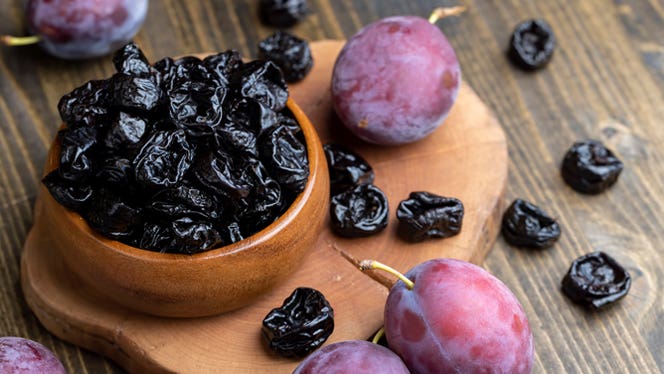
Bone Health and More: 7 Reasons Prunes Deserve a Dedicated Place in Your Pantry
Did you know those prunes you find in the dried-fruit section of the supermarket have a gourmet pedigree? It's true: Though prunes have a less-than-glamorous reputation in the United States, they are loved throughout much of the world, particularly in France, where large, glossy, incredibly sweet varietals have been cultivated since the 12th century. Read on to learn why prunes are the ultimate healthy indulgence and a must-have ingredient in any whole-food, plant-based kitchen.
Are Prunes and Dried Plums the Same Thing?
In short, yes, prunes are dried plums. But it takes a special kind of plum to make a prune: Prunus domesticus, also called the European or prune plum, which has a higher sugar content than other edible varieties.
Why You Should Be Cooking with Prunes
There's lots to love about prunes, especially for whole-food, plant-based eaters.
1. No preservatives needed: Prunes are minimally processed and naturally shelf stable.
Prunes get their crinkly, candy-sweet goodness from just two things: ripening sunshine and drying heat. No sugar is added to keep the dried plums sweet, and no sulfites are needed to prolong their preservation time. (Check out this video from California Prunes to see the process.)
2. Prunes are inexpensive and available everywhere.
Pound for pound, dried, pitted prunes cost about the same as dates and are less expensive than all other dried fruits except for raisins. You can find prunes in just about any supermarket, too. Shopping tip: When buying a can or pouch of prunes, give it a quick squeeze or shake to make sure the dried fruit inside feels tender and moist and hasn’t clumped together.
3. Prunes are incredibly versatile in the kitchen.
“Prunes have a unique, caramelized, naturally sweet flavor that complements savory and sweet dishes,” says Sharon Palmer, MSFS, RDN, a plant-based nutritionist and author of The Plant-Powered Plan to Beat Diabetes. (Palmer is a partner with Sunsweet prunes.) “You can add them to salads, stews, grain bowls and bean dishes to add a rich flavor, as well as cereals, smoothies, bars, cookies, and cakes.” Palmer even uses them in mujadara: Check out the recipe here. (Palmer notes that oil-free eaters can omit oil from the recipe, using water to sauté instead.)
4. Prunes can be subbed for dates and other dried fruit in just about any recipe.
Got a recipe that calls for dates? Give it a try with prunes. The flavors will be richer, fruitier, more caramel-like, and slightly less sweet—but just as tasty. Our 5 Deliciously Simple Stuffed Date Recipes are great as a starter date-to-prune swap. You can also use them in place of dates in energy balls and bars and grain dishes like Date and Orange Couscous Salad. Puréed prunes (see recipe below) can also be used in place of date paste to sweeten baked goods.
5. Using puréed prunes as a whole-food sweetener is easy.
Unlike dates, prunes are tender enough to blend into a smooth purée without soaking, which means you can have an all-natural sweetener ready in seconds. Simply blitz 8 oz. (1⅓ cups) pitted prunes with ¼ cup hot water, adding more water, 1 Tbsp. at a time, to achieve a consistency that’s thick, smooth, and spreadable. Use immediately or store in the fridge for up to one month. Use it to sweeten sauces and baked goods. (It’s especially good in chocolate recipes.)
There’s also an easy hack for those times when you don’t want to make prune purée from scratch: Pick up some prune baby food! It won’t have the rich, caramelized flavor of freshly blended prunes, but it will work as an all-natural sweetener.
One thing to note about sweetening and baking with prune purée: Its deep brown color will give the final product a darker, browner hue, which is why it works so well in chocolate recipes.
6. There’s serious science to back up prunes’ benefits for heart and bone health.
“Prunes enrich your diet with fiber, potassium and vitamin K,” explains Palmer. Numerous studies have linked prunes to improved cardiovascular health and lower total cholesterol levels. Notably, a yearlong clinical trial published in 2022 in the American Journal of Clinical Nutrition found that postmenopausal women who ate five to six prunes daily experienced slowing of age-related bone loss after just six months. The study authors noted that participants did so well sticking with a daily dose of prunes that it represents a valuable nonpharmacologic treatment strategy for preserving hip bone mineral density in postmenopausal women and possibly reducing hip fracture risk.
7. Prunes help you poop.
Last but certainly not least: Yes, it’s true that prunes help you have regular bowel movements—and it’s probably due to the fruit’s unique combination of fiber and sorbitol, a naturally occurring carbohydrate. Studies have shown that prunes worked better than psyllium (a common laxative ingredient) to relieve mild to moderate constipation.

About the Author

About the Author
Mary Margaret Chappell
Join our mailing list
Get free recipes and the latest info on living a happy, healthy plant-based lifestyle.
By providing your email address, you consent to receive newsletter emails from Forks Over Knives. We value your privacy and will keep your email address safe. You may unsubscribe from our emails at any time.